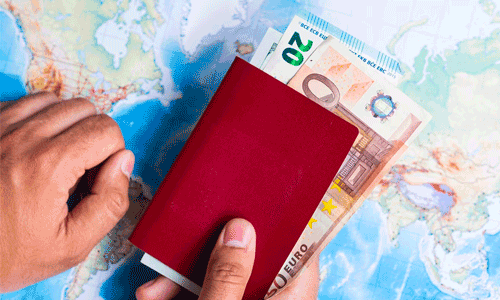- What is Schengen Travel Insurance UAE?
- Schengen Travel Insurance – Insights
- Types of Schengen Travel Insurance Plans
- Common Inclusions of Schengen Travel Insurance UAE
- Best Travel Insurance for Schengen Visa UAE
- Exclusions of Schengen Travel Insurance UAE
- Schengen Visa: Procedure and Documents Required
- Is Covid-19 Cover Offered in Schengen Travel Insurance Dubai?
- Best Travel Insurance for Schengen Visa UAE
- Eligibility Criteria for Schengen Travel Insurance in Dubai
- Why Would You Need Schengen Travel Insurance?
- Which Countries Are Included in the Schengen Group?
- What are the Prerequisites for Schengen Travel Insurance in Dubai?
- Types of Schengen Visa
- Types of Schengen Visas as Per Number of Entries Allowed
- Schengen Visas as Per the Purpose of Travel
- The Temperature in Schengen Countries
- Best Time to Visit Schengen Countries
- Ideal Ways to Travel in Schengen Countries
- Things to Do in Schengen Countries
- Schengen Travel Insurance FAQs
- Other Insurance
Buy Schengen Travel Insurance in UAE
Best Travel Insurance for Schengen Visa
What is Schengen Travel Insurance UAE?
Schengen travel insurance in the UAE is designed for those planning to visit the Schengen Area, which encompasses 27 European countries. This area offers free movement across borders for short stays such as tourism, business, or transit, usually up to 90 days.
This type of insurance is necessary for obtaining a Schengen visa for travellers from countries that don’t have a visa-liberalisation agreement with the Schengen states.
With Schengen travel insurance, you can have coverage for various unexpected events, including medical emergencies, trip cancellations or interruptions, and baggage issues.
Keep in mind that the insurance must necessarily meet specific criteria, including a minimum coverage amount for medical expenses and repatriation, to be valid for Schengen visa applications.
To meet Schengen visa requirements, travel insurance must cover medical emergencies and repatriation for a minimum of €30,000. Moreover, the insurance should be valid throughout the entire Schengen zone and for the duration of the traveller’s stay.
Important: Verify that your chosen insurance policy specifically states its compliance with Schengen visa requirements. This is because not all travel insurance policies offer the necessary coverage.
Schengen Travel Insurance – Insights
|
Number of Countries Covered |
26 European Countries |
|
Eligibility Criteria |
UAE residents or citizens 30 days to 65-70 years old |
|
Schengen Tourist Visa Duration |
90 days |
|
Major Benefits Included in the Plan |
Emergency medical expenses, trip cancellation and curtailment, baggage loss or delay, travel document loss, personal belongings theft covers |
|
Minimum Sum Insured Required for Schengen Travel Insurance |
30,000 euros |
|
Mandatory Status |
Yes |
|
Covid-19 Cover Benefit |
Available with most providers |
|
Automated Policy Extensions |
Available at the discretion of the provider |
|
Claim Procedures |
Both online and offline |
Types of Schengen Travel Insurance Plans
Several types of Schengen visas are available for UAE nationals and residents, with each visa being designed for different travel purposes —
- Uniform Schengen Visa (USV): This visa is for short-term stays of up to 90 days within a 180-day period. There are two categories under this visa type.
Type ‘A’ for airport transit: It allows you to pass through the international zone of a Schengen airport without entering the Schengen zone.
Type ‘C’ for short-term visits: This includes tourism, business, or family visits across the Schengen countries with different entry options (single, double, or multiple entries). - Limited Territorial Validity Visa (LTVV): This visa allows you to travel only within the Schengen country that issued it or in the specific Schengen countries mentioned when you applied.
It's generally issued for the same duration as the USV but restricts your travel to particular countries within the Schengen Area. - National Visa (Type D): Designed for longer stays, this visa is for individuals planning to study, work, or live in a Schengen country. The national visa can vary based on the specific country's regulations and may allow for both single and multiple entries into the Schengen Area.
It is suitable for those looking to stay in a Schengen country for more than 90 days. - Airport Transit Visa (Type A): Necessary for certain nationalities passing through the international zone of Schengen airports during a layover, this visa does not allow entry into the Schengen Area itself but is required for transiting through certain airports.
- Short-Term Schengen Visa (Type C): The most common type of visa issued for tourism, business visits, or family visits, it permits travel for up to 90 days within a 180-day period.
It can be granted as a single, double, or multiple-entry visa, depending on your travel needs.
| Travel Insurance by Age Group | ||
|---|---|---|
| Travel Insurance for over 65 | Travel Insurance for over 70 | Travel Insurance for over 75 |
Common Inclusions of Schengen Travel Insurance UAE
From medical emergencies to trip interruptions, Schengen travel insurance covers various aspects of your travel. Mentioned below are some prominent inclusions of Schengen travel insurance —
- Emergency Medical Expenses: This covers the costs of urgent medical care required during your trip due to accidents or sudden illnesses, including hospital, pharmaceutical, and ambulance expenses. It typically does not cover dental conditions but may include follow-up outpatient treatment after hospital discharge for a set period.
- Emergency Dental Care: Schengen travel insurance covers emergency dental treatments necessary for pain relief so that you can address immediate dental issues without enduring the trip in discomfort.
- Emergency Medical Transportation: If you face a serious health issue, the insurance covers the costs of transportation to a better-equipped or nearer hospital, or even repatriation to your country of residence if necessary.
- Repatriation of Mortal Remains: In the unfortunate event of death, the insurance takes care of the formalities and costs associated with the transport of the body back to the home country or country of citizenship, excluding burial or inhumation expenses.
- Premature Return Costs: If you need to return home suddenly due to the death of a close relative, the insurance can cover the additional costs for your repatriation on an economy flight.
- Visit of a Close Relative: If you are hospitalised for more than a week during your trip, the insurance may cover the travel expenses for a close relative to visit you. This way, it ensures comfort and support when it's most needed.
- First Aid and Rescue: This includes reimbursement for the costs of first aid and rescue efforts, particularly in scenarios involving adventure sports, provided the necessary options and premiums have been selected.
Best Travel Insurance for Schengen Visa UAE
Here is a comprehensive list of cheapest Schengen travel insurance uae
| Plan Name | Medical Cover | Max Duration | Starting from | Price |
|---|---|---|---|---|
| Alliance Insurance | AED 150,000 | 90 days/trip | AED 22 |  |
| Orient Insurance | AED 150,000 | 92 days/trip | AED 183 |  |
| See More Plans >> | ||||
Exclusions of Schengen Travel Insurance UAE
- Unnotified Expenses: Costs for treatments or repatriation that were not pre-approved by the insurance provider
- Non-Essential Treatments: Costs related to treatment or surgery that are not directly associated with the accident or illness that required hospital admission or could be reasonably postponed until returning to the country of residence.
- Pre-Existing Conditions and Regular Medications: Any treatment required for conditions known before departure or medication that was already being taken before travelling
- Psychological Conditions: Costs related to emotional disorders unless they result in hospital admission
- After-Return Expenses: Any expenses incurred after returning to your country of residence
- Non-Compliance with Health Advice: Expenses arising from tropical diseases when recommended vaccinations were not taken or travelling against medical advice
- Cosmetic Treatments: Costs for prosthetics, cosmetic surgeries, plastic surgeries, and physiotherapy that are not linked to an accident or illness
- Preventive Medicine: Charges related to preventive medicine such as health check-ups and medical examinations
- Pregnancy and Related Conditions: Any medical treatment or conditions related to pregnancy, including convalescence and relapses
- Mandatory Tests by Authorities: Costs associated with medical tests required by airlines, governmental entities, or airport authorities
| Does Travel Insurance cover Pregnancy? |
Schengen Visa: Procedure and Documents Required
UAE citizens holding a valid UAE passport are not required to get a Schengen visa to travel to Europe and other Schengen countries. Without obtaining a visa, UAE passport holders can enter the Schengen countries and stay there for up to 90 days. However, a Schengen visa is required for UAE residents and ex-pats. Given below is the complete procedure to obtain the Schengen visa for UAE residents:
- Collect the visa application form and fill it out. Print two copies of the form, fill them both and sign them properly at the required spaces.
- Check with an embassy or a travel consultant to find out which Schengen country would need to give you a visa, as the visa centre or embassy you will be required to visit will depend on the country you pick.
- Schedule an appointment with the visa centre in the UAE. Take your visa form and carry other required documents when you go for your appointment.
- An interview will be conducted at the visa centre. Submit all the required documents and wait for the response.
- You will get a notification once your application has been processed and approved.
| UAE Family Residence Visa – Requirements, Costs |
Documents Required
The application form – duly filled out and signed.
Passport – Have your valid passport ready. The passport must not be more than 10 years old, and its validity must extend at least 3 months from your date of departure from Schengen countries.
Photographs – Keep two passport size photographs ready as well. The photographs must not be older than 3 months and should have a bright coloured background.
Proof of Residence – A valid proof of residence in the UAE extending at least 3 months beyond your departure date from Schengen countries
Flight Itinerary – Documented proof for travel flight tickets to and from the Schengen area, and proof of accommodation in the area
Cover Letter – A cover letter explaining your reason to visit the Schengen countries is also required
Proof of financial means showing that you can support yourself in the Schengen area
Schengen Travel Insurance – Policy documents of your Schengen travel insurance
Is Covid-19 Cover Offered in Schengen Travel Insurance Dubai?
Most types of Schengen travel insurance dubai plans now offer a specialized cover for Covid-19. Depending on your provider, your travel insurance for Schengen Visa may also come with a Covid-19 cover. Typically, a Covid-19 Schengen travel insurance Dubai cover will activate when you are diagnosed positive with Covid-19 during your travels. Your insurance company will cover the cost of mandatory quarantine that comes after the positive test results up to a certain number of days. The coverage generally offered is for 7 days. However, it can differ from provider to provider. Mandatory quarantine upon arrival is not covered by Covid-19 travel insurance cover in Schengen travel insurance Dubai plans or any other kind of travel insurance for that matter.
Best Travel Insurance for Schengen Visa UAE
Eligibility Criteria for Schengen Travel Insurance in Dubai
You do not have to clear a specific eligibility criterion to buy travel insurance for Schengen Visa. Any resident or citizen older than 18 years can buy Schengen travel insurance UAE in their name. Children under the age of 18 years can be included as dependents in the plan of parents. Any child older than 30 days can be insured with Schengen travel insurance in Dubai. The buyer must be able to produce the required identity proof in the form of a passport, resident’s visa, and Emirates ID, as asked by the insurance company. Folks older than 65-70 years can buy Schengen travel insurance for senior citizens.
Why Would You Need Schengen Travel Insurance?
- Medical Coverage: It covers emergency medical expenses, accidents, and sudden illnesses. This includes costs for hospitalisations, emergency treatment, doctor visits, and necessary medications.
- Repatriation for Medical Reasons and Death: In case of serious illness, injury, or death, Schengen travel insurance covers expenses for repatriation to the home country.
- COVID-19 Protection: Although not mandatory, most policies now include coverage for COVID-19-related medical treatment and quarantine expenses.
- Trip Coverage: Although not a requirement for the Schengen visa, several travel insurance plans offer financial protection against flight cancellations, delays, and lost luggage, so that you're covered against various travel disruptions.
- Mandatory Requirement for Visa: For many travellers, having valid travel medical insurance is mandatory when applying for a Schengen visa. The policy must meet specific criteria, such as minimum coverage of €30,000 and validity across all Schengen countries for the entire stay.
- Financial Security: Ultimately, with Schengen travel health insurance providing financial security against expensive medical treatments, you can have peace of mind in the knowledge that you're covered in case of emergencies while travelling.
Which Countries Are Included in the Schengen Group?
There are a total of 26 countries in the Schengen group of countries. This makes most of the European countries except for Ireland, Romania, Croatia, Cyprus and the countries that are going to be a part of the latter group. The included 26 Schengen countries are given below:
|
Austria |
Denmark |
France |
Hungary |
|
Latvia |
Netherlands |
Norway |
Belgium |
|
Estonia |
Germany |
Greece |
Lithuania |
|
Liechtenstein |
Poland |
The Czech Republic |
Switzerland/td> |
|
Slovakia |
Sweden |
Luxembourg |
Spain |
|
Slovenia |
Finland |
Malta |
|
|
Italy |
Portugal |
Iceland |
|
What are the Prerequisites for Schengen Travel Insurance in Dubai?
Travel insurance for Schengen Visa is required to have an assured sum of at least 30,000 Euros. It must cover all kinds of medical emergencies, repatriation expenses, and accidental treatment and hospitalization costs. The validity of the plan must match the length of your trip in Schengen countries. Every available Schengen travel insurance in Dubai comes with a minimum of the aforementioned benefits. The better, more comprehensive plans will have the higher assured sum and other travel inconvenience benefits as well.
Types of Schengen Visa
Schengen visas can be categorised into several types as per the allowed number of entries and purpose of visit. The major types of Schengen Visas can be further divided into two levels of sub-categories. Given below is a complete guide for the classification system of Schengen Visas:
Types of Schengen Visas as Per Number of Entries Allowed
Uniform Schengen Visa
A Uniform Schengen Visa allows the holder to reside in a Schengen area for a maximum of 90 days. It can be obtained from any one of the Schengen countries or group members. As per the types of entry system allowed, a Uniform Schengen Visa can be further categorised into 3 types. Given below is a brief description of each kind of Uniform Schengen Visa:
Single-Entry Visa: As the term suggests, the holder of this Schengen visa can enter the Schengen area only once. Upon exit, the holder cannot return to the Schengen area on the same visa. One should note that this applies even when you haven’t completed the number of allowed days on your single-entry visa.
Double-Entry Visa: The only difference between single and double-entry Schengen visas is that one allows single entry, while the other allows you to go into the Schengen area twice. However, the total number of days allowed in the Schengen area remains unchanged.
Multiple-entry Visa: As evident from the title, holders of this visa are allowed multiple entries in the Schengen area. The visa holders cannot stay any more than 90 days within the 6-month duration allowed. This rule stays in place for all kinds of Schengen visas. Multiple-entry visas can be obtained across three different kinds of visas – 1 year, 3 years, and 5 years – as explained below:
1 Year Multiple-Entry Visa: You must have obtained at least 3 Schengen visas in the past 2 years and used them lawfully to get a 1-year validity multiple-entry visa.
3 Year Multiple-Entry Visa: You must have used a 1-year multiple-entry visa to get a 3-year multiple-entry visa.
5 Year Multiple-Entry Visa: You must have used any of the other two multiple-entry visas for 2 years in total in the past 3 years.
Limited Territory Validity Visa
A limited territory visa allows you to enter only the Schengen countries mentioned on the visa. Unlike a uniform Schengen visa, you are not allowed to visit any Schengen country besides the mentioned one with a limited territorial validity visa. This visa is generally issued as an exception on humanitarian grounds. For instance, people travelling for a special authorised purpose without complete travel documents may get this visa. The holder of this Schengen visa is only allowed to visit or even transit through Schengen countries listed as the first and last destinations on the visa.
National Visas
The national Schengen visa is a type of permanent resident visa for Schengen countries. This visa is given to people looking to move to a Schengen country for work or study purposes. A national visa can be granted as either a single or multiple-entry visa, depending on the applicant’s needs. For example, a single entry national Schengen visa may be granted to people who need to visit a Schengen area for medical treatment.
Schengen Visas as Per the Purpose of Travel
Airport Transit Visa: If you need to travel through the Schengen area to get to another country
Transit Visa: People who need to stop in the Schengen area and move ahead via the sea
Tourist Visa: For people who are coming to the Schengen area on a vacation — it allows the holder to visit any of the Schengen countries
Family or Friend Visit Visa: For people visiting family or friends legally residing in the Schengen area
Business Visa: For people travelling for work and business reasons
Official Visit Visa: For people travelling for delegation-related purposes
Medical or Treatment Visa: For people requiring visas specifically to seek medical treatment in the Schengen area
Study Visa: For students ready to be admitted to one of the universities in the Schengen area
Cultural, Sport, or Other Event-Related Visa: For performers and other people who are a part of events in the Schengen area — if someone is a part of an event in the Schengen area but does not live there, they can obtain this visa for their visit.
The Temperature in Schengen Countries
Season |
Months |
Temperature |
|---|---|---|
|
Spring |
March – May |
Low – 5° C High – 14° C |
|
Summer |
June – August |
Low – 14° C High – 24° C |
|
Autumn |
September – November |
Low – 7° C High – 14° C |
|
Winters |
December – February |
Low – 0° C High – 5° C |
Best Time to Visit Schengen Countries
The Autumn season in the Schengen area gets more tourists than any other time of the year. The weather is pleasantly cold, and slight precipitation also graces the area with its presence. For people living in the UAE, the autumn season is one of the best possible times to visit Schengen countries like Belgium, Sweden, Netherlands, etc. Autumn is also the busiest season for countries like Italy and Spain. Just keep in mind the heavy crowds if you plan to visit these countries.
On the other hand, if cold weather is your forte, visiting Iceland in summer will be a wonderful experience. This Viking country is filled with geological marvels and will certainly deliver a few surprises in culture, festivals, events, and cuisines. Winters in Schengen countries like Poland and Iceland, while especially cold, are definitely worth a visit. The temperature is almost always at 0°C or lower, with an icy blue blanket covering everything.
Ideal Ways to Travel in Schengen Countries
Trains are a rather popular way to go around Schengen countries. Such exquisite train rides are perfect to get yourself acquainted with the raw beauty of Schengen countries. Additionally, most day-trip spots like Bruges, Antwerp, and Ghent are easily accessible via train. As an added advantage, public transportation will not only help you save extra cash on the trip but also relieve you from the pressure of driving on vacation. If you are in a country like Greece, consider taking ferry rides in addition to trains, as you will find it relaxing to spend your vacation days in the open calm waters.
Bikes are also favoured when it comes to travelling in the Netherlands. You will see plenty of people cruising down the streets on their bikes. Meanwhile, if you are in Germany, buses, trains, and flights are all viable modes of transportation, and you can pick one as per your budget.
In countries like Hungary, Austria and the Czech Republic, travelling via buses is generally considered the most suitable. In the end, you can pick any mode of transportation that suits your requirements and preferences the best, regardless of its popularity in the area.
Things to Do in Schengen Countries
Given that you will only get a maximum of 90 days to spend in the Schengen area within any given period of 6 months, visiting all 26 Schengen countries is unrealistic. However, a few common Schengen destinations can be found on every list of favourites. Given below are a few exciting things you can do in some of the most popular Schengen countries among tourists:
Italy: Ancient Rome, Tuscan Hill towns, Lake Como tours, skiing on the Dolomites, listening to Opera, and visiting the infamous Colosseum are a few things you can consider adding to your to-do list.
France: Home to the infamous Eiffel Tower, the Palace of Versailles, and the Notre Dame, France is easily one of the most-visited places in the world. Plan your trip to France around the glorious castles, historical monuments, and numerous beautiful restaurants and cafés.
Iceland: When it comes to an out-of-the-world luxury experience, Iceland is surely among the top of the list any day of the year. A wonder to witness in any season, Iceland offers plenty of adventure activities, luxury-laden dips in hot springs, world-famous concerts and parties, and a glimpse of the Viking history and culture. You can include one element from each available variant to sculpt a fabulous trip.
Germany: You can consider visiting beautiful castles of Germany, gardens, museums showcasing both historical and modern wonders, Berchtesgaden National Park, the famous cathedrals in the country.
Spain: If UNESCO world heritage sites appeal to you, Spain has a lot in store for your travel. Besides fascinating museums, fun festivals, gardens, and castles, there are over 40 UNESCO world heritage sites in the country. Prepare your itinerary keeping every important tourist attraction in mind.
Schengen Travel Insurance FAQs
Yes, Schengen travel insurance plans can be bought as business travel insurance plans as well.
Yes, most travel insurance companies allow you to cancel your travel insurance for Schengen Visa if your Visa application gets rejected. You also get a refund since the trip has not begun yet.
Yes, you can buy Schengen travel insurance as both individual and family travel insurance. The availability of the plan variations can depend on the provider you choose.
Yes, senior citizens, mostly over the age of 65, would be required to buy a separate Schengen travel insurance plan. They can not be included in a family Schengen travel insurance plan.
Contact the insurance provider when faced with an inconvenience. The concerned representative will initiate a claim request and inform you about the steps to be followed next and documents to be collected. Prepare the claim form and documents to submit an official claim request online or offline.
Yes, a travel insurance certificate or proof of travel insurance is a mandatory document to get your Schengen Visa. Ask your insurance company to provide you with the certificate when you finalize your purchase.
Generally, travel insurance for Schengen Visa only covers you in the Schengen group of countries.
Schengen travel insurance costs can differ as per the plan benefits and the provider that you have chosen. However, the starting Schengen travel insurance cost in Dubai can be anywhere between AED 40 to AED 50 on a per-day basis.
Other Insurance
Car Insurance Dubai | Best Car Insurance in UAE | Health Insurance Dubai | Health Insurance Cost | Term Insurance | Life Insurance | Best Investment Plans | Life Insurance Companies in UAE | Monthly Investment Plan in UAE
Travel Insurance Type
Travel Insurers

More From Travel Insurance
- Recent Articles
- Popular Articles




















































































